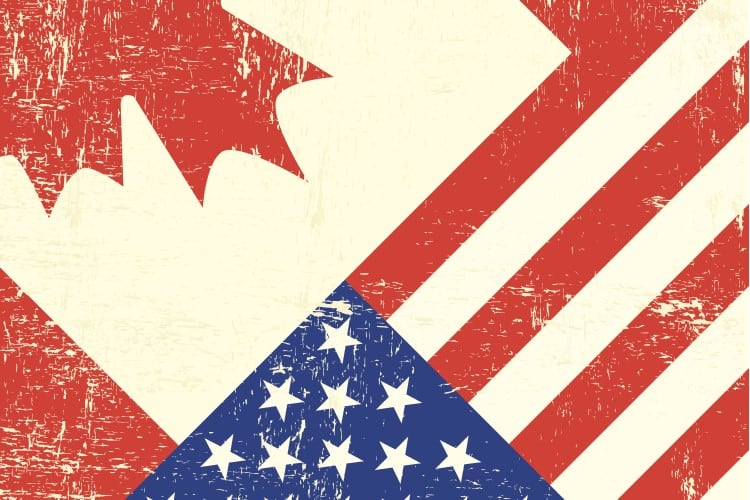The US has failed in its attempt to challenge Canada’s dairy tariff-rate quota (TRQ) allocation system and gain improved market access under the US-Mexico-Canada-Agreement (USMCA).
The US wanted Canada to further revise its dairy TRQ criteria to iron out what it called ‘inconsistencies’ with several provisions of the USMCA. For example, the US argued that Canada’s market share-based allocation system favored some applicants, such as processors, over other applicants, effectively rendering retailers and foodservice operators unable to apply for TRQ allocation.
The dispute followed an earlier dispute between the two counties in 2021, when the dispute settlement panel ruled that Canada’s policy to reserve 85% to 100% of TRQs exclusively for processors was in breach with treaty terms. Canada has since removed its ‘allocation holder pools’ under all TRQs and has included ‘distributors’ as eligible applicants under the industrial cheeses tariff-rate quota.
But in 2022, the US launched a second dispute to challenge Canada’s dairy import quota allocation system. Canada’s current policy is based on a calculation of an applicant’s market share during a 12-month reference period, and how this market share is calculated also differs depending on the type of applicant. Th US argued that Canada was breaching its USMCA obligations by imposing a 12-month activity requirement; its market share-based criteria limited access to shares of the quota exclusively to processors and discriminated against new importers; and did not allow importers ‘the greatest possible opportunity’ to fill a TRQ.
According to the International Dairy Foods Association (IDFA), the US exported more than $1bn worth of dairy products to Canada in 2022, making it the second largest market for US dairy exports. However, US dairy exporters were unable to fill any Canadian dairy quotas granted in the USMCA; the average tariff fill rate was only 42% across all 2022/23 quotas, with 9 of the 14 TRQs falling below half the negotiated value for the same period, the Association stated.
But the latest dispute ended in disappointment for the US, after the three-person panel voted two to one that Canada’s system did not breach USMCA terms. US trade representative Katherine Tai commented: “I am very disappointed by the findings in the USMCA panel report. Despite the conclusions of this report, the United States continues to have serious concerns about how Canada is implementing the dairy market access commitments it made in the agreement.
“While the United States won a previous USMCA dispute on Canada’s dairy TRQ allocation measures, Canada’s revised policies have still not fixed the problem for US dairy farmers. We will continue to work to address this issue with Canada, and we will not hesitate to use all available tools to enforce our trade agreements and ensure that U.S. workers, farmers, manufacturers, and exporters receive the full benefits of the USMCA.”
Agriculture secretary Tom Vilsack added that the US would ‘continue to voice deep concerns about Canada’s system’.
‘Profoundly disappointing’: US trade bodies react
US dairy trade bodies have condemned the decision. IDFA called the ruling ‘a surprising setback for US dairy’ and a ‘glaring failure to safeguard the most fundamental rights outlined in the USMCA’. IDFA president and CEO Michael Dykes, D.V.M, said the Association commended ‘the hard work of the US government’ and the ‘the outcome of this dispute is not an indication of the government’s efforts’. “Yet, we are completely stunned and deeply disappointed by this panel’s failure to defend even the most basic rights outlined in USMCA.
“This outcome sadly confirms what the US dairy community and US negotiators collectively feared from the outset of USMCA negotiations - that Canada’s supply management system is so imbalanced and so far outside a rules-based and free market trading system that no existing set of rules is comprehensive enough to effectively curb its distortive impacts.”
Dykes called on the current administration to ‘urgently reset its trade policy agenda’, suggesting a US-first approach to trade should be adopted. “Against the backdrop of escalating global conflicts and food insecurity, it is imperative that the United States advance new negotiations that dismantle distortions undermining rules-based trade. It is time to re-establish the United States as a global leader in negotiating preferential trade agreements with unwavering commitments,” he commented.
The National Milk Producers Federation (NDFA) said that the ruling ‘weakens the agreement’s value to the US dairy industry’. “It is profoundly disappointing that the dispute settlement panel has ruled in favor of obstruction of trade rather than trade facilitation,” said Jim Mulhern, president and CEO of NMPF. “Despite this independent panel’s adverse ruling, we’d like to thank the Biden Administration and the many members of Congress who supported us for their tireless pursuit of justice for America’s dairy sector. We urge Ambassador Tai and Secretary Vilsack to look at all available options to ensure that Canada stops playing games and respects what was negotiated.”
The US Dairy Export Council president and CEO Krysta Harden said that by allowing Canada ‘to ignore its USMCA obligations, this ruling has set a dangerous and damaging precedent’. This is unfortunately not the only shortcoming in Canada’s compliance with its international commitments,” she added, hinting at Canada’s recent dispute with New Zealand under the Comprehensive and Progressive Agreement for Trans-Pacific Partnership (CPTPP). “We are committed to working with USTR and USDA to evaluate efforts to address Canada’s continued harmful actions that depress dairy imports while simultaneously evading USMCA’s dairy export disciplines.”
Could the ruling sway US dairy producers’ voting preferences?
With the top dairy producers concentrated in US states with a large number of electoral votes – with California, Wisconsin, Idaho, New York and Texas comprising 136 votes in total - the failure to secure a favorable outcome from this USMCA dispute can be considered a blow for the Biden-Harris administration. Upon launching the latest dispute in 2022, secretary Vilsack said that obtaining access to the Canadian market for US producers and exporters was ‘an important priority for this administration’, but Friday’s ruling could throw a wrench in the Democrats’ efforts to appeal to the US dairy community. The IDFA president’s remark about resetting the US’ trade policy agenda in the face of global upheaval also chimes in with what many voters would be thinking.
According to a Gallup poll, 41% of Americans think the US is doing ‘too much’ to help Ukraine defend itself against Russia, driven by growing concerns among republicans. At the same time, the share of Americans that say the US ‘should be a neutral mediator’ in the Israel-Palestine conflict has increased to 39% in a new Reuters/Ipsos poll, up from 27% in October.
In Canada, dairy’s clout on politics is also strong, as the country’s circa 10,000 farmers – most based in Quebec and Ontario, where the majority of parliamentary seats are located – form an influential political lobby. The decades-old dairy supply management system sets production amounts based on forecasted consumer needs. Even domestic producers require authorization in the form of a quota to sell their produce, and there are price and anti-competition rules to ensure the industry is shielded from milk price instability and an influx of imported products. In September 2023, New Zealand won a dispute against Canada over the latter's administration of dairy tariff rate quotas under the CPTPP. The panel found that Canada was not administering its dairy TRQs in a manner that allowed importers the opportunity to utilize them fully, and that Canada is impermissibly limited access to TRQ quota to its domestic dairy processors.




